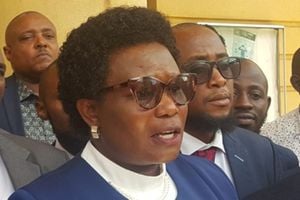
Top row: Governors Susan Kihika (Nakuru), Johnson Sakaja (Nairobi) and Kimani Wamatangi (Kiambu). Bottom row: Moses Badilisha (Nyandarua), Kawira Mwangaza (Meru) Abdi Guyo (Isiolo) and Andrew Mwadime (Taita Taveta).
Midway through their five-year terms, seven governors are hoping to break the curse of one term that befell their predecessors, with the unfolding political realignments likely to influence the elections in 2027.
The appointment by President William Ruto of some allies of his predecessor Uhuru Kenyatta have interested some of these governors who have congratulated the beneficiaries – former county bosses they consider their rivals in the next elections.
Nairobi, Kiambu, Nakuru, Meru, Taita Taveta, Nyandarua and Isiolo are the counties that have never re-elected governors since the advent of devolution in 2013.
Nairobi and Kiambu have had a record four governors, three each in the last two terms.
Nakuru Governor Susan Kihika has welcomed the nomination of her predecessor, Lee Kinyanjui, as the Cabinet Secretary for Investment, Trade and Industry.
Mr Kinyanjui is viewed as one of her major competitors, particularly if had he stuck to the opposition as the Kenya Kwanza administration increasingly becomes unpopular.
The governor is, perhaps, happy that they both are to become members of the Kenya Kwanza government.
Political formation
Ms Kihika has faced the hostility voters are directing at the government. Recently, Governor Kihika and ruling coalition lawmakers were heckled at a funeral where she struggled to read President Ruto’s condolence message.
The nomination of former Kiambu governor William Kabogo as Information, Communications and Technology CS also adds a twist to the political formation in the county now led by Mr Kimani Wamatangi.
Mr Kabogo and Mr Moses Kuria, who was dismissed as Public Service Cabinet Secretary and later appointed as President Ruto’s adviser, unsuccessfully contested the Kiambu governor seat in 2022.
Kiambu has become the hotbed of defiance against President Ruto’s administration, with the rebellion led by former deputy president Rigathi Gachagua’s allies – Senator Karungo Thangwa and Woman Representative Gathoni Wamuchomba.
Defenders of Mr Gachagua in Nyandarua are Senator John Methu and Kipipiri MP Wanjiku Muhia. Nyandarua Governor Moses Badilisha is fighting to overcome the one-term curse.
Nairobi Governor Johnson Sakaja had frosty relations with Mr Gachagua during his tenure as deputy president.
After his impeachment in October, Mr Gachagua said the Nairobi governor’s position is part of his 2027 political calculations.
Mr Gachagua accuses Mr Sakaja of pursuing policies that hurt Mt Kenya people who have many businesses in the city.
Days to his impeachment, he held a rally at Muthurwa market, where he condemned the plan by the devolved government to move traders to Kangundo Road.
Mr Gachagua’s ally, Embakasi North MP James Gakuya, has declared interest in the Nairobi governor seat in 2027.
Nairobi had Dr Evans Kidero as its first governor in 2013. He was defeated by Mr Mike Sonko in the 2017.
Mr Sonko, however, did not complete his term as he was impeached by the Nairobi County Assembly in 2021. The Senate voted to uphold his dismissal.
Ms Ann Kananu took over the running of the city. She led the county government with Lt-Gen Mohamed Badi of the Nairobi Metropolitan Services until Governor Johnson Sakaja was elected in August 2022.
In Kiambu, Mr Kabogo failed in his 2017 re-election bid. He was dethroned by Mr Ferdinand Waititu.
Like in Nairobi, Mr Waititu was impeached by the county assembly in January 2020, paving the way for his deputy James Nyoro to take over. In the 2022 election, Dr Nyoro lost to Mr Wamatangi.
Nakuru pioneer governor Kinuthia Mbugua lost his re-election bid to Mr Lee Kinyajui in 2017. Mr Kinyanjui suffered a similar fate in 2022 the race.
It has been the same case in Meru, where first governor Peter Munya was defeated by Mr Kiraitu Murungi in 2017.
In the last election, Mr Murungi lost to Ms Kawira Mwangaza, who is now in trouble after the Senate confirmed her impeachment.
She, however, remains in office courtesy of court orders.
Nyandarua’s first governor Daniel Waithaka was succeeded by Mr Francis Kimemia in 2017. Mr Kimemia would lose to Mr Badilisha in 2022.
It was the same scenario in Taita Taveta where first governor John Mruttu failed to secure a second term in 2017 after losing to Mr Granton Samboja.
In 2022, Mr Samboja lost to Mr Andrew Mwadime.
In Isiolo, efforts by pioneer governor Godana Doyo to secure a second term were scuttled by Mr Mohammed Kuti in 2017.
Mr Kuti, however, did not defend his seat in 2022, citing health reasons. This paved the way for Mr Abdi Guyo to become the third governor of Isiolo. Mr Doyo attempted a comeback in 2022 but lost.
Mr Sakaja says the city has multi-billion shilling stalled projects as a result of replacing governors in every election. He, however, believes he will break the curse through his programmes, including Dishi na County.
“Nairobi needs a chance to have an administration that runs its full course. I’ll give you the example of Bungoma. They vote in Governor Ken Lusaka; he does his work. They remove him, and bring Mr Wycliff Wangamati to start other projects. Then they return Mr Lusaka to look at his own projects,” Mr Sakaja said.
“In Nairobi, Kidero started his projects, was removed and Sonko came in and started his projects before NMS came in and started their own. Here I am trying to finish projects started by Kidero and Sonko. Nairobi has not benefited fully from devolution because of this start-stop trend. Every leader comes with a philosophy and his or her style of working. Ours is different.”
He added that his opponents believe they will have no chance if they leave him to deliver on his promises.
“There are those interested in the seat. When we started school feeding, some politicians fought it because they want to be governor. Some sponsored cases in court against the programme,” he said.
“They think if Sakaja succeeds, how will they change the hearts of city residents and their children?”
Mr Wamatangi highlights his achievements in health, education, agriculture, water, transport and enhancing Kiambu’s own source revenue collection as part of his strategy for re-election.
He lists the construction and equipping of 109 ECDE centres and feeding programmes, increase of bursary allocations, a healthcare plan covering 100,000 households, twenty new level four and three hospitals to the distribution of inputs to farmers.
“My focus has remained on serving people to recover the 10 years the county wasted on unnecessary infighting and leadership driven by self-interests,” he said.
“Despite being in office for just two years, we have visible and impactful projects and programmes in all wards.”
He added that as some other leaders are busy with politics, his focus has been serving the people.
“In 2027, no one will be rewarded by voters, based on how much we shouted or abused others. It will be about what we would have done to change the lives of Kiambu residents,” he added.
The governor cites the rehabilitation of more than 1,000 kilometres of access roads, construction of a county aggregation and industrial park in Githunguri and the supply of nearly 228 kilometres of assorted pipes and fittings to extend water services across the county.
Mr Wamatangi says his administration has significantly increased bursary allocation to Sh500 million, benefiting more than 100,000 students across Kiambu’s 60 wards.
“Every student receives Sh5,000 to Sh10,000 in bursary,” Mr Wamatangi said.
Giants felled
Governor Kihika told the Daily Nation that she seeks to break the one-term curse in Nakuru by delivering high-impact and life-transforming projects.
She said health, agriculture, water, education, trade and industry form the core of her plans for Nakuru County.
“Since I assumed office, I have committed 40 per cent of the budget to expanding and improving healthcare and medical services. I am fulfilling my pledge of every sub-county being served by a Level Four hospital with the ground-breaking ceremony of the hospital in Kuresoi North constituency in the New Year,” she told the Daily Nation.
“I have been to more than half of the villages in Nakuru County, ringfencing those that voted for me in 2022 and bringing on board those that did not. With more transformative projects in the pipeline and the unity of people, I am confident that residents of Nakuru County will give me another term as their governor.
She added that the county would have 15 Level Four hospitals providing specialised care.
“We have built maternity wings at several health centres, more than 10 new dispensaries and handed more than 200 health workers permanent and pensionable terms,” Governor Kihika said.
“Hospital visits are up by seven per cent for outpatients and inpatients at 11 per cent. We have fully automated 15 hospitals and are now extending that to health centres and dispensaries all over the county. Our health facilities are fully stocked with drugs all year,” she said.
Ms Kihika added that even though devolved governments are confined to providing Early Childhood Education, Nakuru has been providing bursaries to more than 60,000 needy post-primary education learners.
She said her administration intends to increase bursary allocation from Sh342 million in the last financial year to more than Sh400 million this financial year.
Her administration, she added, established the County Enterprise Fund and the Cooperative Revolving Fund, each with a Sh50 million kitty to provide affordable loans to traders.
Governor Kihika said Nakuru County has attracted seven investors at the Naivasha SEZ, among them Jumbo AAA Holdings – the first used vehicle Auctioneers on the continent.
“These investments are projected to provide more than 2,000 jobs to our young people directly and at least 4,000 indirect jobs, in addition to ready markets for our farm produce,” she said.
Governor Badilisha told the Daily Nation that he has embraced inclusivity and actively listens to Nyandarua residents.
“When developing my Change Manifesto, the economic challenges facing our people guided me. Unlike other counties in central Kenya with coffee and tea as cash crops, Nyandarua had none. Pyrethrum was our hope but the industry collapsed,” he said.
“Our farmers rely on potatoes as the main cash crop. Apart from reviving pyrethrum, this administration has introduced and promoted alternative cash crops, the latest being apple farming. We have also introduced subsidised Artificial Insemination at Sh400. At the end of it all, every household will have at least one or two county government-supported economic generating activities.”
Another strategy for his re-election, Mr Badilisha said, is initiating youth and women-friendly programmes, including distributing equipment worth Sh200 million in two years.
Ms Mwangaza who felled political giants to become the third county boss in Meru, is keen on retaining her seat despite the impeachment troubles.
The Meru governor is banking on regular grassroots meetings and charity events dubbed “Okolea”, spearheaded by her Baite Family Fellowship Church.
Ms Mwangaza’s One cow-One Needy Family programme was abandoned when the Meru County Assembly froze funding, citing lack of an approved policy document.
The Meru governor had also intended to initiate a housing programme for the poor but the initiative was trashed by the ward representatives.
“They are fighting me because I am implementing projects that are impacting the poor directly,” Ms Mwangaza said recently.
On Thursday, the governor said she would resume her grassroots development tours in January and urged Members of the County Assembly to join her camp.
Additional reporting by Waikwa Maina and David Muchui









